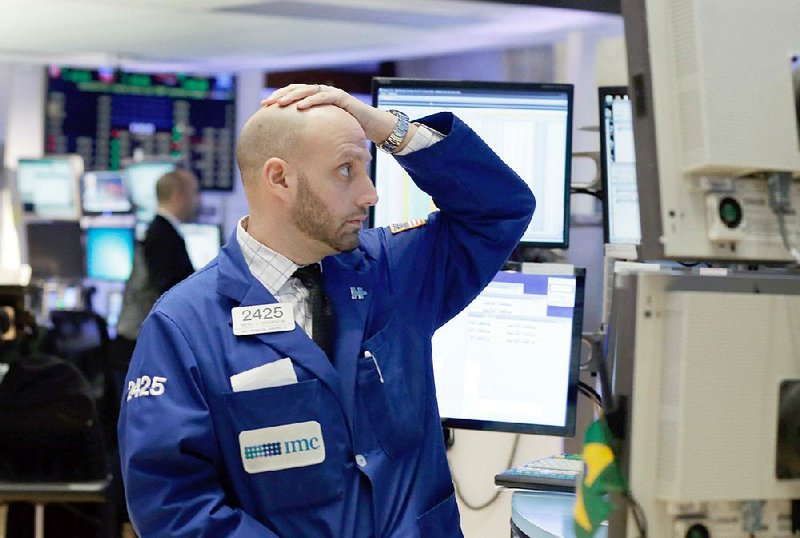NEW YORK -- The new year got off to a slow start on Wall Street as stocks tumbled Monday in a global selloff triggered by new fears of a slowdown in China and rising tensions in the Middle East.
In the U.S., the Dow Jones industrial average slumped 276.09 points to 17,148.94, its biggest loss in two weeks. It was down as much as 467 points earlier in the day.
The Standard & Poor's 500 index lost 31.28 points, or 1.5 percent, to 2,012.66. The Nasdaq composite fell 104.32 points, or 2.1 percent, to 4,903.09.
The wave of selling on the first trading day of 2016 served as a reminder that worries over the fragile global economy that weighed on financial markets last year are not going away anytime soon.
"It's going to be a turbulent year," said Kevin Kelly, chief investment officer of Recon Capital Partners. "This isn't a blip."
The trouble started in China, where weak manufacturing figures in the world's second-largest economy sent the Shanghai Composite Index plunging 6.9 percent before Chinese authorities halted trading.
Investors were also unnerved by tension between Saudi Arabia, a huge oil supplier, and Iran. Saudi Arabia executed a prominent Shiite cleric, prompting Iranian protesters to set fire to the Saudi Embassy in Tehran on Sunday. The price of oil swung wildly.
The selling in China spread quickly across markets in other Asian countries, then to Europe. The DAX index in Germany tumbled 4.3 percent. Britain's FTSE 100 fell 2.4 percent, while France's CAC 40 dropped 2.5 percent.
Huang Cengdong, an analyst for Sinolink Securities in Shanghai, said he expects more turmoil in the Chinese stock market ahead of corporate earnings reports. "There will be heavy selling in the near future," Huang said.
Elsewhere in Asia, Japan's Nikkei 225 tumbled 3.1 percent, and Hong Kong's Hang Seng retreated 2.7 percent. South Korea's Kospi closed 2.2 percent lower.
In the U.S., investors were also worried about data suggesting that slow overseas growth and low oil prices are continuing to hurt U.S. manufacturers. A report from the Institute for Supply Management showed manufacturing contracted last month at the fastest pace in more than six years as factories cut jobs and new orders shrank.
In China, the Caixin/Markit index of manufacturing fell in December for the 10th straight month. The resulting stock drop at markets in Shanghai and Shenzhen led authorities to halt trading under a "circuit breaker" mechanism announced late last year. It was the first time China used the system.
The slowdown in China is worrisome around the globe because the country's manufacturers are huge buyers of raw materials, machinery and energy from other countries. Also, many automakers and consumer goods companies are hoping to sell more to increasingly wealthy Chinese households.
Chinese authorities have been trying for months to restore confidence in the country's market after a plunge in June rattled global markets and prompted a panicked, multibillion-dollar government intervention.
Ernie Cecilia, chief investment officer of Bryn Mawr Trust, warned that investors shouldn't overreact to Monday's drops.
"A weak first day of the year doesn't portend that 2016 will be a down year," Cecilia said. "There are a lot of trading days left."
Benchmark U.S. crude oil fell 28 cents to close at $36.76 a barrel on the New York Mercantile Exchange after rising in morning trading. Brent crude, the international standard, edged down 6 cents to close at $37.22 a barrel in London.
Bond prices rose, sending yields lower. Investors tend to park money in U.S. government bonds when they are fearful of weak economic growth or turbulence in stocks and other markets. The yield on the 10-year Treasury note fell to 2.24 percent from 2.27 percent.
In metals trading, gold rose $15 to $1,075.20 an ounce, silver lost 4 cents to $13.84 an ounce and copper fell 6 cents to $2.08 a pound.
In other energy trading in New York, wholesale gasoline rose 2 cents to $1.291 a gallon, heating oil rose a quarter of a cent to $1.126 a gallon and natural gas edged down 0.3 cent to $2.334 per 1,000 cubic feet.
Information for this article was contributed by Youkyung Lee and Fu Ting of The Associated Press.
Business on 01/05/2016
